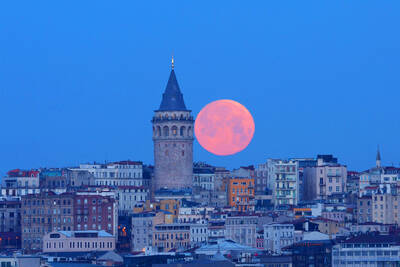Russian President Vladimir Putin personally approved the arrest of a US reporter on espionage charges for the first time since the Cold War, people familiar with the situation said.
The Russian president’s endorsement of the move reflects the growing influence of Kremlin hardliners who push for deepening a confrontation with Washington they view as irreversible, the people said, speaking on condition of anonymity to discuss matters that are not public.
The detention of Wall Street Journal reporter Evan Gershkovich on March 29 triggered angry denunciations from the US and its allies, marking yet another low in US-Russian ties, which have spiraled since Putin’s invasion of Ukraine last year.

Photo: EPA-EFE / SERGEY KARPUHIN / SPUTNIK / KREMLIN POOL
“This should be a real wake-up call, not just to the US, but the broader West,” said Alina Polyakova, president of the Center for European Policy Analysis think tank in Washington. “It’s signaling that in Putin’s mindset that there’s no going back to a stable and reliable relationship.”
As the war drags into its second year, the Kremlin has increasingly sought to portray it as an existential struggle against a NATO bent on destroying Russia.
Moves including a war crimes-related international arrest warrant against Putin have only deepened the leadership’s sense that there is no room to back down in a conflict that it expects to last for years.
The Russian parliament this week rushed through a sharp toughening of penalties for those who seek to avoid military service.
The changes create a new online system to deliver call-up notices and ban those who ignore them from leaving the country, closing loopholes many had used to avoid the draft.
The measure, expected to be signed into law soon by Putin, has fueled fears that a new mobilization might come later this year.
The Kremlin said there are currently no such plans.
Last year’s call-up of 300,000 reservists triggered the exodus of as many as 1 million Russians.
The initiative to arrest a US reporter on spying charges for the first time in nearly 40 years came from hawks among top officials of Russia’s security services, the people with knowledge of the issue said.
Kremlin spokesman Dmitry Peskov said it was not Putin’s decision, but was “the total prerogative of the special services. They were doing their job.”
Those agencies report directly to the president.
Gershkovich, 31, was detained in Yekaterinburg, about 1400km east of Moscow, by Russian Federal Security Service agents.
Charged with spying, which carries a 20-year prison term, he is being held in Moscow’s Lefortovo prison, to which Russia has not granted the US consular access.
The Kremlin said he was caught “red handed,” but has provided no evidence.
The Wall Street Journal has denied the allegations.
The US Department of State has formally determined that Gershkovich has been wrongfully detained by Russia, which opens the way to the US to negotiate on his behalf.
Russia has pushed to include in previous prisoner swaps Kremlin insider Vladislav Klyushin, who was in February found guilty of insider trading and hacking, separate people familiar with the matter said.
He has information relating to the hacking of Democratic Party servers during the 2016 US presidential election, they said.
Last year, Russia and the US conducted two prisoner exchanges, including in December when they swapped US basketball star Brittney Griner for Russian arms dealer Viktor Bout.
US President Joe Biden spoke with Gershkovich’s family on Tuesday, assuring them that “the government is doing everything in its power to bring him home as quickly as possible,” the family said in a statement.
With the public focus on the case, the US might have no choice but to negotiate, encouraging more such hostage-taking, Polyakova said.
“The Russians are getting far more aggressive and they’ve seen that when you take high-profile US citizens hostage, you get what you want,” she said.

ANGER: A video shared online showed residents in a neighborhood confronting the national security minister, attempting to drag her toward floodwaters Argentina’s port city of Bahia Blanca has been “destroyed” after being pummeled by a year’s worth of rain in a matter of hours, killing 13 and driving hundreds from their homes, authorities said on Saturday. Two young girls — reportedly aged four and one — were missing after possibly being swept away by floodwaters in the wake of Friday’s storm. The deluge left hospital rooms underwater, turned neighborhoods into islands and cut electricity to swaths of the city. Argentine Minister of National Security Patricia Bullrich said Bahia Blanca was “destroyed.” The death toll rose to 13 on Saturday, up from 10 on Friday, authorities

RARE EVENT: While some cultures have a negative view of eclipses, others see them as a chance to show how people can work together, a scientist said Stargazers across a swathe of the world marveled at a dramatic red “Blood Moon” during a rare total lunar eclipse in the early hours of yesterday morning. The celestial spectacle was visible in the Americas and Pacific and Atlantic oceans, as well as in the westernmost parts of Europe and Africa. The phenomenon happens when the sun, Earth and moon line up, causing our planet to cast a giant shadow across its satellite. But as the Earth’s shadow crept across the moon, it did not entirely blot out its white glow — instead the moon glowed a reddish color. This is because the

DEBT BREAK: Friedrich Merz has vowed to do ‘whatever it takes’ to free up more money for defense and infrastructure at a time of growing geopolitical uncertainty Germany’s likely next leader Friedrich Merz was set yesterday to defend his unprecedented plans to massively ramp up defense and infrastructure spending in the Bundestag as lawmakers begin debating the proposals. Merz unveiled the plans last week, vowing his center-right Christian Democratic Union (CDU)/Christian Social Union (CSU) bloc and the center-left Social Democratic Party (SPD) — in talks to form a coalition after last month’s elections — would quickly push them through before the end of the current legislature. Fraying Europe-US ties under US President Donald Trump have fueled calls for Germany, long dependent on the US security umbrella, to quickly

Local officials from Russia’s ruling party have caused controversy by presenting mothers of soldiers killed in Ukraine with gifts of meat grinders, an appliance widely used to describe Russia’s brutal tactics on the front line. The United Russia party in the northern Murmansk region posted photographs on social media showing officials smiling as they visited bereaved mothers with gifts of flowers and boxed meat grinders for International Women’s Day on Saturday, which is widely celebrated in Russia. The post included a message thanking the “dear moms” for their “strength of spirit and the love you put into bringing up your sons.” It